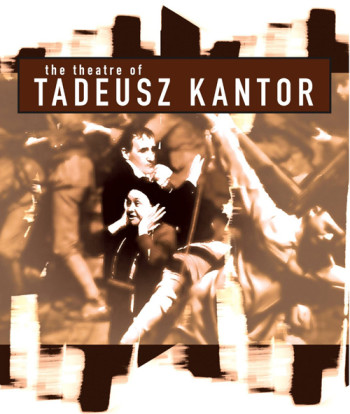October 2, 2015
Granoff Center
Michal Kobialka, Professor of Theatre in the Department of Theatre Arts & Dance at the University of Minnesota, presented a talk on Kantor’s representational practices and today’s political theatre. Professor Kobialka has published over 75 articles, essays and reviews on medieval, eighteenth-century and contemporary European theatre, as well as the theatre Tadeusz Kantor.
Tadeusz Kantor (1915-1990), Polish visual artist and theatre director, was born on April 6, 1915. He can be placed among a select group of the twentieth century’s most influential theatre practitioners. The breadth and diversity of his artistic endeavors align him with such diverse artists as, for example, Marcel Duchamp, Vsevelod Meyerhold, Oscar Schlemmer, Jackson Pollock, Jerzy Grotowski, Christo, Allan Kaprow, Robert Wilson, or Pina Bausch. Kantor was positioned within the avant-garde movements represented by those artists. He started to work as artist during the modernist revolution instigated by the first wave avant-garde in France and the Soviet Union in the 1920s and 1930s. His experiments with Informel Art, Emballages, and the Happenings took place at the time of the post-war European and American second wave avant-garde in the 1960s. His most widely known productions, outside of Poland, The Dead Class (1975), Wielopole, Wielopole (1980), Let the Artists Die (1985), I Shall Never Return (1988), and Today is my Birthday (1990) co-existed with diverse forms of postmodern art and theatre.
Professor Kobialka is a Professor of Theatre in the Department of Theatre Arts & Dance at the University of Minnesota. He has published over 75 articles, essays and reviews on medieval, eighteenth-century and contemporary European theatre, as well as the theatre of Tadeusz Kantor. He will give a lunch talk entitled Of Memory and History: Tadeusz Kantor’s Theatre of Minima Morali as part of the commemoration of the centenary birthday of Tadeusz Kantor (1915-1990). Sponsored by the Department of Theatre Arts & Performance Studies and the Creative Arts Council. This is the first in a series of lectures and discussions with Kobialka, Kantor’s foremost expert in the West.
He is the author of two books on Tadeusz Kantor’s theatre, A Journey Through Other Spaces: Essays and Manifestos, 1944-1990 [University of California Press, 1993; the book was translated into Romanian under the title: O Călătorie ĭn Alte Spaţii: Teatrul lui Tadeusz Kantor (Cluj-Napoca: Casa Cărţii de Ştiinţa, 2010)] and Further on, Nothing: Tadeusz Kantor’s Theatre (University of Minnesota Press, 2009; the book received the honorary mention for 2010 ATHE Outstanding Book Award). He is the editor of Of Borders and Thresholds: Theatre History, Practice, and Theory (University of Minnesota Press, 1999), a co-editor (with Barbara Hanawalt) of Medieval Practices of Space (University of Minnesota Press, 2000), and a co-editor (with Rosemarie Bank) of Theatre/Performance Historiography: Time, Space, Matter (Palgrave, 2015). His book on the early medieval drama and theatre, This Is My Body: Representational Practices in the Early Middle Ages (University of Michigan Press, 1999) received the 2000 ATHE Annual Research Award for Outstanding Book in Theatre Practice and Pedagogy.



